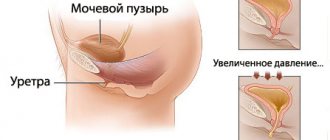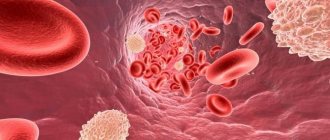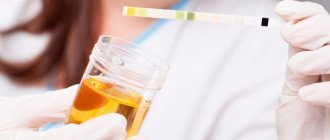Even the ancients understood that diseases could be recognized by smell. The famous Greek physician Hippocrates sensed diabetes from the smell of fruit in a patient’s mouth, and Chinese doctors sensed typhus from the smell of fresh bread. This is how many diseases associated with metabolic disorders manifest themselves, including through the smell of urine discharge.
Of course, bad breath isn't always dangerous, but if your urine smells strange for a long time, you should be concerned. When urine suddenly changes smell or color, this is a sign of serious illness. Learn how to recognize dangerous symptoms.
Where does acetone come from in urine?
Its presence in urine has a medical name - acetonuria (another name is ketonuria). This is not a disease. This is a medical term that defines one of the states of chemical metabolic processes when the product of fat breakdown - acetone - is produced in excessively large quantities, and the body simply does not have time to “utilize” it.
Substances that cause the strong odor of acetone, ketones, are formed in the liver. This is a by-product released during the breakdown of fats. Carbohydrates take part in this process. If chemical processes occur normally, without failures, acetone is safely excreted in the urine. If there are not enough carbohydrates to break down, or too much fat comes in (this happens with excessive intake of fatty foods), then more ketones are formed than are broken down. That’s when the woman begins to experience strange, unpleasant discharge.
What does fresh urine from a healthy person smell like?
The content of the article
Fresh urine has a specific and unmistakable smell, but this can change depending on our health or the food we have eaten.
In a healthy person, urine is amber in color, relatively light and transparent. However, if it becomes slightly red, it may be a sign of serious kidney problems, bleeding diathesis, or a stone in the urinary tract.
The smell of ammonia necessarily indicates a dangerous concentration of ammonium phosphate in the urine, while diabetic acidosis manifests itself as the smell of acetone.
A dark, even brown color means increased levels of bilirubin, which is formed as a result of the death of red blood cells.
Bilirubin crystals in urine
However, not all odor changes are created equal.
Symptoms of acetonuria
The appearance of a pungent, specific odor in urine is not the only symptom of acetonuria. The problem is often accompanied by:
- ammonia odor in the mouth;
- loss of appetite;
- lethargy;
- vomiting and nausea.
If a person experiences these symptoms all at once, you should not delay for a second - you should immediately go to the doctor. This is a signal that there are problems with possible serious consequences, such as dehydration, damage to the central nervous system, and even coma.
Lack of complete control over your body causes discomfort and uncertainty. This especially affects girls and women who, at the slightest physical exertion - coughing, experience such embarrassment as involuntary urination. Read more in the article: “involuntary urination in women.”

If, of all the alarming signals, only an unpleasant odor of urine is observed in women, the causes of the problem may not be so large-scale. Checking the acidity of urine will help you understand the depth of the problem. You can use a rapid test for this. They are sold in all pharmacies.
Dip the test strip into freshly collected urine. If the color of the strip does not change, the acidity level is normal. If the strip turns pink, it means there is acid, but in small quantities. If litmus turns purple, this is an indicator of the critical content of acetone (or other acids) in urine. In the latter case, you cannot delay your visit to the doctor.
The smell of maple syrup
Another metabolic disorder that causes foul-smelling urine is something called maple syrup disease (MUSD). As in the case of asparagus and trimethylaminuria, the cause of its occurrence is also a genetically determined disorder in the metabolism of amino acids (leucine, isoleucine, valine) with autosomal recessive inheritance.
In MSUD, inhibition of biochemical reactions at the level of branched-chain alpha-keto acid dehydrogenesis causes the accumulation of both alpha-keto acids and leucine, isoleucine and valine in the blood, cerebrospinal fluid and urine, which in turn causes symptoms of the disease.
The patient's urine smells like maple syrup or burnt sugar. The effectiveness of treatment varies depending on the depth of the metabolic defect and the time of initiation of therapy. Untreated babies usually die at the end of the first year of life, so postnatal testing is critical as soon as the mother or doctor notices the smell. Starting treatment in the first week of life reduces the consequences of the disease.
Postnatal examination of the child
Reasons for the appearance of acetone
If you smell a strong smell of urine in a woman, the reasons should be sought in impaired metabolism. Failures can be explained by both complex inflammatory processes and less alarming circumstances.
Society is so frightened by the terrible diagnosis of oncology that any neoplasm entails panic and stress. Fortunately, not all growths and internal growths are cancerous; a larger percentage of tumors are not cancer. Read more in the article: “thyroid cyst on ultrasound, what to do.”
Let's name the main reasons for bad urine odor in women:
- diabetes;
- long fasting, poor diet;
- increased physical activity;
- alcohol intoxication;
- food poisoning;
- severe and prolonged stress;
- viral infections that are accompanied by high temperature and fever;
- oncological formations in the gastrointestinal tract.
If the strong sour smell disappears after about 2-4 days, there is nothing to worry about. The acid-base balance returned to normal.

For example, if acetonuria is caused by excessive physical fatigue or stress, simply resting is enough. If the appearance of acetone is associated with a very long diet or a sharp lack of carbohydrates in the body, you just need to adjust the daily diet. Elderly people often suffer from ketonuria.
The body of older people reacts with acetone to elevated body temperature and any form of intoxication. With the elimination of this problem, the situation with acetone is also solved. If we are talking about food or alcohol poisoning, we need to cleanse the body, and the acid balance will return to normal along with the normalization of the gastrointestinal tract.
We need to take acetonuria, which is caused by inflammatory processes, much more seriously. Only a doctor can determine the exact cause of the problem by conducting additional laboratory tests of blood and urine. Therefore, if stress, strain, diets are not your case, immediately go to the doctor.
Acetone for diabetes
The most common cause of acetone in the urine is diabetes (it is no coincidence that it is in first place on our list of causes). Acetonuria is most often accompanied by severe diabetes. The problem is that with the prolonged course of this disease, the human body loses a lot of carbohydrates. This leads to an imbalanced acid balance.

In addition to acetone, the patient’s condition in this case is also characterized by lethargy, poor appetite, and loss of attention.
The appearance of acetone in the urine of a patient with diabetes is a very alarming signal for the doctor: it often precedes a diabetic coma.
The exact date of onset of coma cannot be determined by the amount of ketones in urine, but timely diagnosis allows urgent measures to be taken.
Possible reasons why urine smells like acetone
Ketone, or acetone, bodies are metabolic products of acetyl-CoA, which is synthesized from the body’s own proteins, and in case of a lack of nutrients, from fats. Ketones include acetoneacetic acid, beta-hydroxybutyric acid (BOHBA) and acetone. With an excess of these compounds in the blood, ketonemia increases, when acetone and a characteristic odor are detected in the urine. This condition is usually a consequence of metabolic disorders and diseases.
Diabetes
Most often, ketosis and ketonuria occur against the background of diabetes mellitus (DM). In type I diabetes, the lack of insulin and an excess of its antagonist hormones (glucagon, hydrocortisone, norepinephrine, etc.) come to the fore. With metabolic problems, lipids are rapidly broken down. Ketones are synthesized from breakdown products.
In type 2 diabetes, ketonemia is not as pronounced. Therefore, acetone in the blood and urine often increases in type 1 diabetes.
Acetone bodies appear in the urine and blood if you miss an insulin injection, after a heavy load, against the background of an infectious disease and other stress factors. This means that acetone in the urine has become a sign of decompensation of the disease. Diabetics with ketosis and ketones in the urine are often hospitalized for medical care. Often, ketones in the analysis are the first indicator of diabetes mellitus.
Hyperthyroidism
Hyperthyroidism is characterized by an increase in the production of thyroid hormones. With hyperfunction of the thyroid gland, the rate of all types of metabolism in the body, including protein-lipid, increases. A negative nitrogen balance indicates increased breakdown of protein structures.
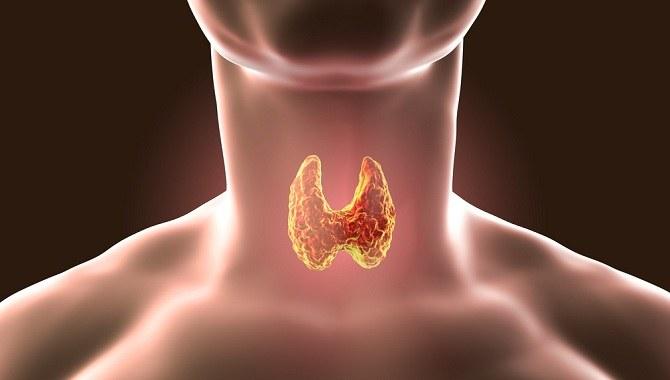
A large amount of thyroid hormones stimulates the breakdown of fats. Ketone bodies (that is, acetone) are intensively synthesized from lipids.
This is why the urine of people with hyperthyroidism smells like acetone. Usually this is a specific sweetish-ammonia smell. However, the urine does not change color.
Poor nutrition, diets, fasting
Nutrition plays an important role in the occurrence of ketonuria. Acetone begins to be synthesized when there is a lack of nutrients (for example, fasting or a strict calorie-restricted diet).
A lot of ketones are also released into the urine when following a ketogenic diet. A prominent example is the Atkins diet. This type of nutrition involves the complete exclusion of carbohydrate foods from the diet, as well as filling it with fatty and protein foods.
Acetone in the blood suppresses the feeling of hunger. But it also stimulates the accumulation of uric acid and increased excretion of calcium in the urine. This can later lead to gout and osteoporosis.
That is, acetone in the blood and urine is a sign that there is an excess amount of fat in the diet.
Inflammations of the genitourinary system
Infections of the genitourinary tract are inflammatory processes. Any systemic inflammation is characterized by metabolic disorders. Acetone begins to be excreted in the urine from the first days of the disease. Therefore, with pyelonephritis or cystitis, a characteristic ammonia odor of urine appears.
To confirm a genitourinary tract infection, it is enough to take a general urine test. In addition to bacteria, red blood cells and proteins, the biomaterial will contain a large amount of acetone. On the form, laboratory assistant Fr.
Liver diseases
The liver is the site of synthesis of acetone and other ketone bodies. Hepatitis and other liver diseases lead to changes in lipid metabolism. The consequence of this is intense ketogenesis.
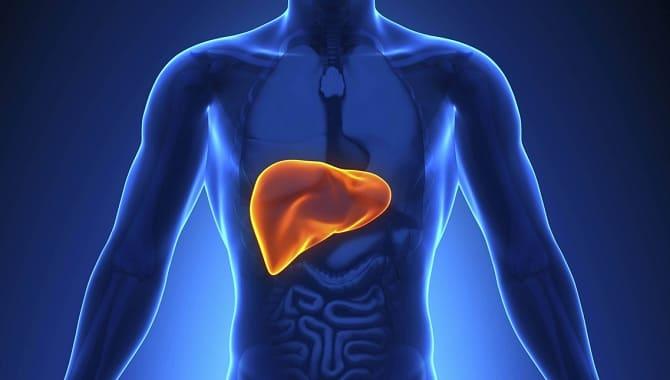
Increased excretion of ketones in the urine can accompany both acute and chronic hepatitis.
To confirm liver pathology, a biochemical blood test is performed. It pays attention to the liver complex: ALT, AST, bilirubin, GGT and total protein. With hepatitis, not only urine, but also the skin may smell of acetone.
Treatment of the underlying disease quickly relieves ketonuria.
Dehydration
Loss of fluid and electrolytes is a powerful stimulator of ketogenesis. Acetone appears in the urine when the body is dehydrated for various reasons: from being in a hot climate to increased vomiting due to infections.
Ketonemia develops rapidly due to loss of electrolytes in children. Therefore, it is very important for children to restore water and electrolyte balance as soon as possible.
If severe dehydration is suspected, special urine test strips should be used to confirm ketonuria.
Infectious diseases
Digestive tract infections are often accompanied by vomiting and/or diarrhea. Against the background of pronounced loss of fluid and electrolytes, an acetonemic crisis quickly develops. Ketones begin to actively accumulate in the blood and are excreted in the urine.
Acute intestinal infections accompanied by vomiting and diarrhea:
- cholera;
- salmonellosis;
- rotavirus infection;
- Norfolk infection;
- food poisoning.

Elimination of the main cause is carried out after stabilization of the condition. In adults, dehydration does not increase as rapidly, but in children, the terminal (fatal) stage of dehydration can occur in a matter of hours. Therefore, intestinal infections with diarrhea syndrome are especially dangerous for children. Acetone in the blood and urine begins to increase already at the first stage of exicosis (dehydration).
Esophageal stenosis
Acetone can increase in severe pathologies, for example, with esophageal stenosis. Oncological processes in its wall often lead to a narrowing of the lumen of an organ. Men are more susceptible to this disease. Therefore, when acetone appears in the urine in combination with characteristic signs of esophageal stenosis (dysphagia, chest pain, drooling, sudden weight loss), it is necessary to consult a doctor as soon as possible and perform an FGDS.
Stress
Mental health is directly related to physical health. Stress actively affects metabolism throughout the body, including lipid metabolism. Therefore, the smell of acetone in the urine of an adult sometimes occurs when experiencing emotional events and stress.
Poisoning
Foodborne toxic infection is also accompanied by the active accumulation of acetone in the body. The pathogenesis is identical to intestinal infections. Lack of fluid due to severe vomiting and diarrhea plays a key role. In case of poisoning, urine with the pungent odor of acetone is often released.
To avoid consequences, in case of poisoning, it is necessary to maintain the water-salt balance by drinking plenty of fluids or other methods of rehydration (drips).
Acetone in urine in pregnant women
Doctors name several possible reasons for the appearance of ketones in urine during pregnancy. Quite often this is caused by an unbalanced diet. Pregnant women overindulge in sweets, causing the onset of gestational diabetes. A passion for sweets, as well as excessive intake of high-fat foods, can cause ketonuria. That is why gynecologists insist on following a strict diet to ensure the normal course of pregnancy.
In addition, unpleasant discharge can be associated with severe fatigue and an aggressive environment. The female body does not have time to adapt quickly and reacts this way.

However, acetone in the urine during pregnancy can also be caused by an exacerbation of the disease, namely:
- oncological problems;
- liver disease;
- late toxicosis;
- hormonal imbalance.
Some of these painful conditions can result in termination of pregnancy, so acetone in urine in this case cannot be taken lightly.
Determination of the amount of acetone in the body
There are two main ways to diagnose the amount of acetone in urine:
- Get tested in the laboratory
. If you suspect an increased amount of acetone in the urine, the doctor will prescribe a referral for a general urine test. This analysis is taken in the morning, in a clean and dry container, in compliance with standard morning hygiene.
- Do the test at home
. Due to the spread of the problem of acetone in urine, tests for determining the amount of acetone in urine began to be freely available in pharmacies.
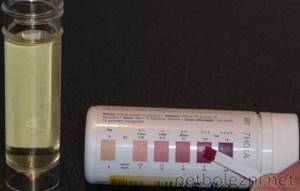
It is recommended to purchase not one, but several tests at once. Conduct testing in the morning for three days in a row. The test strip is lowered into a container with collected urine, a waiting time is maintained and the result is assessed. The number of ketone bodies is determined by the color of the band. Pink color means the presence of acetone in the urine. Purple color means excess acetone. Of course, the result of home testing will not be accurate, but it will establish the very fact of the presence or absence of a pathological amount of acetone.
Important to remember! The normal level of acetone in urine is 0.01-0.03 g per day.
If there are no ketone bodies in the urine, this is normal. If there is an insignificant, minimal amount, there will be a plus on the analysis form. One plus means that the reaction is weakly positive. Two or three pluses are positive, and four or more are critical.
Of course, the outpatient option is preferable, since not only the presence of ketones is analyzed, but also their ratio. Ultrasound of the abdominal organs, CT, MRI, and tests for tumor markers may also be prescribed.

The main things you need to know about acetonuria
Let us outline the most important thing that you need to know about yourself if you feel ammonia in your urine.
- Acetonuria should be taken seriously if it does not resolve on its own within a couple of days.
- The most common cause of acetone in the urine is a severe form of diabetes mellitus, it is a symptom of a near diabetic coma. Emergency medical intervention is required.

- A number of factors (stress, long-term diets, fasting, food and alcohol poisoning, physical fatigue) that cause acetonuria are in no way related to the disease and require only minor adjustments in behavior and lifestyle. After eliminating the cause (for example, stopping the protein diet and introducing carbohydrates into the diet), the level of liH should normalize within a few days, and the unpleasant odor should disappear.
- In all other cases, you need to urgently contact a doctor. This is especially true for pregnant women. Acetonuria in pregnant women has been poorly studied. What causes it is more speculation than proven facts. In medical science, there is an opinion that acetone in the urine can lead to early termination of pregnancy. And although most scientists adhere to another version, that this is absolutely safe and goes away with childbirth, you should not neglect doctor’s supervision and systematic consultations.
Measures to prevent the appearance of acetone odor
At the end of the article, a few words about what to do to prevent and protect the body from the appearance of acetone in the urine. The most important thing is to maintain an active and healthy lifestyle.
These include moderate physical activity, swimming and contrast showers as ways to harden the body, adequate sleep for at least 7-8 hours a day, walks in the fresh air to improve immunity and prevent anemia, proper drinking regimen, and avoid stressful situations. If acetone reappears in the urine, it is recommended to undergo diagnostics of the whole body at least 2 times a year.



